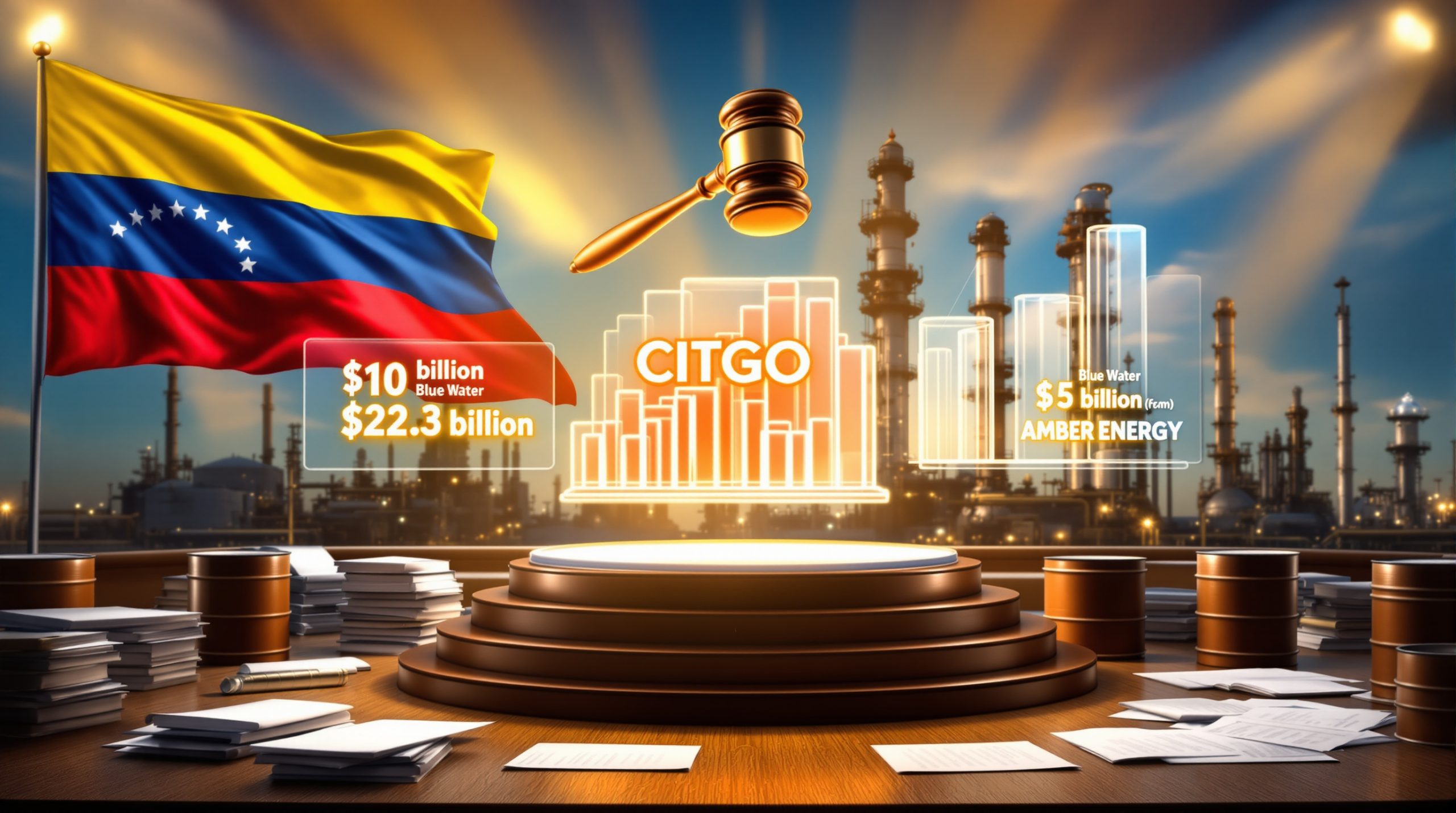New Rival Bid Intensifies Battle for Citgo's Parent Company
The corporate struggle for control of Citgo Petroleum's parent company has escalated with the emergence of a new contender, adding another layer of complexity to an already intricate situation. This development marks a significant turning point in negotiations that have been ongoing for months, potentially reshaping the future of one of America's largest oil refining companies.
The introduction of this rival bid in fight for citgo's parent company transforms what was already a high-stakes corporate contest into an even more complex multinational struggle with implications extending beyond the energy sector into geopolitics, international finance, and U.S. energy security.
Key Players in the Corporate Battle
The Current Ownership Structure
Citgo Petroleum Corporation operates as a subsidiary of PDV Holding, which is ultimately owned by Petróleos de Venezuela, S.A. (PDVSA), Venezuela's state oil company. With approximately 3,400 employees across the United States, Citgo represents one of the most significant Venezuelan assets abroad. The ownership chain has become increasingly complicated due to Venezuela's ongoing political and economic challenges.
This ownership structure has created a uniquely complex situation where corporate governance, international relations, and legal disputes have become thoroughly intertwined.
The New Bidder
While the identity of the new bidder remains confidential, industry analysts speculate it could be one of several major energy conglomerates seeking strategic expansion of downstream operations in the U.S. market. This mysterious entrant joins an already competitive field of potential acquirers interested in Citgo's valuable refining assets.
Market observers note that the timing of this bid is particularly significant, coming as several legal proceedings regarding Citgo's future approach critical decision points.
Existing Stakeholders
Several groups have previously expressed interest in acquiring control of Citgo's parent company:
- Major international oil companies looking to expand their refining capacity
- Financial consortiums backed by private equity and sovereign wealth funds
- Creditors of Venezuela seeking to recover billions in unpaid sovereign debt
- U.S. entities concerned with the national security implications of ownership changes
The competition among these diverse stakeholders highlights the strategic value of Citgo's assets beyond mere financial considerations.
Strategic Value of Citgo's Parent Company
Extensive Refining Assets
Citgo controls three major refineries with a combined processing capacity of approximately 769,000 barrels per day, representing about 4% of total U.S. refining capacity:
- Lake Charles, Louisiana (425,000 bpd capacity)
- Corpus Christi, Texas (167,000 bpd capacity)
- Lemont, Illinois (177,000 bpd capacity)
These facilities are strategically positioned to process various crude oil types, including heavy sour crude from Venezuela, providing valuable flexibility in today's volatile energy markets.
Comprehensive Distribution Network
The company's extensive distribution infrastructure includes:
- Approximately 4,500 branded retail locations across 30 states
- 38 refined product terminals strategically positioned throughout the U.S.
- Three fully owned pipelines and joint interests in 11 others
- Access to key transportation hubs and markets
This logistics network represents significant value beyond the refining assets themselves, offering any potential owner immediate access to diverse U.S. fuel markets.
Financial Performance
Despite the complications surrounding its ownership, Citgo has maintained relatively strong operational performance:
- Annual revenue exceeding $30 billion
- EBITDA typically ranging between $1.5-2.5 billion annually, depending on refining margins
- Substantial cash reserves that have attracted potential buyers
This financial resilience has made Citgo particularly attractive to both strategic industry buyers and financial investors seeking stable cash flows.
Origins of the Battle for Control
The Venezuelan Connection
The fight for control of Citgo's parent company is inextricably linked to Venezuela's economic and political crisis. As Venezuela's government faced mounting financial pressures following years of economic mismanagement and falling oil prices, Citgo emerged as one of its most valuable foreign assets, attracting attention from creditors seeking repayment.
The situation has been further complicated by the political divide within Venezuela, with competing government factions each claiming rightful control over PDVSA and, by extension, Citgo.
Debt and Default Issues
Venezuela and PDVSA have defaulted on billions of dollars in debt, leading multiple creditors to target Citgo assets as a potential source of recovery. This created a legal environment where various parties have claimed rights to the company through:
- Court judgments in multiple jurisdictions
- International arbitration awards
- Defaulted bond agreements with specific collateral provisions
- Commercial claims from former business partners
The resulting legal tangle has created unprecedented challenges for resolving ownership questions.
U.S. Sanctions Impact
U.S. sanctions against Venezuela have significantly complicated the ownership situation. The U.S. government has implemented measures that effectively froze control of Citgo, preventing its sale or transfer without appropriate authorizations from the Treasury Department's Office of Foreign Assets Control (OFAC).
These sanctions have created a regulatory overlay that any potential transaction must navigate, adding another dimension to an already complex situation. Furthermore, US–China trade tensions have contributed to market volatility, making valuation of energy assets even more challenging.
Significance of the New Bid
Competitive Implications
The emergence of a new bidder likely changes the dynamics of negotiations by:
- Potentially increasing the valuation of the parent company
- Creating more options for stakeholders to consider
- Adding urgency for existing bidders to finalize their offers
- Forcing reconsideration of previously rejected proposals
This competitive pressure could accelerate the resolution process or alternatively introduce new complications into already complex negotiations.
Timing Considerations
This bid comes at a critical juncture when:
- Several legal proceedings regarding Citgo's future are approaching key decision points
- Global energy markets are experiencing significant volatility
- U.S. policy toward Venezuela continues to evolve
- Refining margins have improved, potentially increasing Citgo's value
Industry experts note that timing could significantly influence both the valuation and regulatory reception of any proposed transaction. Recent Trump tariffs impact on global trade has also created new considerations for any international bidders.
Strategic Positioning
Industry analysts suggest the new bid may represent strategic positioning by an entity seeking to:
- Gain access to valuable refining capacity in key U.S. markets
- Secure downstream integration for crude oil production
- Establish a stronger foothold in the U.S. energy infrastructure
- Preempt competitors from acquiring these strategic assets
The motivations behind the bid could significantly influence how aggressively the bidder pursues the acquisition and what regulatory hurdles they might face.
Legal Complexities in the Corporate Battle
Multiple Creditor Claims
Various creditors have staked claims against Venezuela that potentially involve Citgo assets:
- Bondholders of PDVSA 2020 bonds that were backed by 50.1% of Citgo shares
- Companies with arbitration awards against Venezuela, including ConocoPhillips and Crystallex
- Creditors holding Venezuelan sovereign debt
- Other commercial creditors seeking to recover unpaid debts
These overlapping claims have created a complex legal web that any resolution must address. According to Reuters reporting, multiple bidders have already filed objections with the court overseeing the auction process.
Jurisdictional Complexities
The legal battle spans multiple jurisdictions, including:
- U.S. federal courts in several districts with different rulings
- International arbitration tribunals operating under various treaties
- Venezuelan legal proceedings with competing governmental authorities
- Potential bankruptcy court involvement if restructuring becomes necessary
This multi-jurisdictional nature of the dispute has created situations where different courts have reached contradictory conclusions about the same fundamental issues.
Regulatory Hurdles
Any potential change in control would face significant regulatory scrutiny:
- Committee on Foreign Investment in the United States (CFIUS) review for national security implications
- Federal Trade Commission antitrust considerations, especially for industry buyers
- Treasury Department sanctions compliance requirements
- Environmental regulatory reviews of any ownership transition
These regulatory requirements add another layer of complexity to an already challenging situation.
Potential Outcomes of the Corporate Battle
Possible Scenarios
Several potential outcomes remain possible:
- Complete acquisition by one of the bidding entities, with regulatory approval
- Partial ownership transfer with multiple stakeholders forming a consortium
- Debt-for-equity swap with creditors becoming equity owners
- Continued legal limbo with operational independence under court supervision
- Structured settlement involving multiple parties, potentially including the Venezuelan government
Each scenario presents different advantages and challenges for the various stakeholders involved.
Timeline Expectations
Industry experts suggest resolution could take:
- Several more months of negotiation among creditors and bidders
- Potentially years of additional legal proceedings in multiple courts
- Interim operational arrangements to maintain business continuity
- Gradual resolution of different aspects rather than a comprehensive solution
This extended timeline creates ongoing uncertainty for all parties involved.
Market Implications
The ultimate resolution will likely impact:
- U.S. refining capacity and fuel markets, particularly in regions served by Citgo
- Venezuela's economic recovery prospects and ability to rebuild its oil industry
- Precedents for resolving complex international asset disputes
- Future investment patterns in politically volatile regions
These broader implications explain why the situation has attracted attention beyond the immediate stakeholders. As the OPEC production outlook evolves, the strategic value of Citgo's refining assets may continue to fluctuate.
Operational Impact Amid Ownership Uncertainty
Current Business Continuity
Despite ownership uncertainty, Citgo has maintained relatively stable operations:
- Refineries continue to process crude oil at near-normal rates
- Retail network remains functional across its geographic footprint
- Supply contracts with partners have largely been honored
- Day-to-day management decisions proceed without major disruption
This operational stability represents a remarkable achievement given the extraordinary circumstances.
Employee Concerns
The prolonged battle has created uncertainty for Citgo's workforce:
- Job security questions as ownership remains unresolved
- Potential changes in corporate direction under new ownership
- Possible restructuring if certain creditors gain control
- Challenges in recruiting and retaining talent amid uncertainty
Company leadership has worked to maintain employee morale despite these challenges.
Investment Decisions
The ownership dispute has complicated long-term planning:
- Major capital investments have been limited or delayed
- Expansion opportunities may have been missed
- Maintenance schedules have been prioritized to maintain existing assets
- Strategic partnerships have been difficult to establish
These constraints potentially impact Citgo's long-term competitiveness in the dynamic U.S. refining market. As Alaska oil policy shift creates new domestic supply opportunities, Citgo's ability to adapt to changing crude sources becomes even more important.
Broader Industry Implications
Geopolitical Energy Dynamics
This situation underscores how energy assets often become focal points in international disputes:
- Oil infrastructure as leverage in diplomatic relations
- Corporate ownership as an extension of national interests
- Energy security concerns influencing legal and regulatory decisions
- The intersection of commercial and political considerations
Few corporate disputes so clearly demonstrate the geopolitical dimensions of energy infrastructure.
Corporate Governance Challenges
The case illustrates complex governance issues when:
- State-owned enterprises operate in foreign markets
- Political instability affects corporate ownership
- Multiple legal systems intersect in ownership disputes
- Directors and officers must navigate competing legal obligations
These governance challenges have required unprecedented adaptations by Citgo's management.
Precedent-Setting Potential
How this situation resolves could establish precedents for:
- Recovery of assets in sovereign debt disputes
- Protection of foreign investments during political transitions
- Balancing creditor rights with operational continuity
- Regulatory approaches to sanctions-affected entities
Legal scholars and international business experts are closely watching this case for its potential implications. The resolution could also influence how countries address their energy export challenges in politically complex environments.
FAQ: Key Questions About the Citgo Parent Company Battle
What is Citgo's current operational status amid this ownership dispute?
Citgo continues to operate its three refineries and distribution network under the oversight of a board appointed by Venezuela's opposition-recognized government. Day-to-day operations remain largely unaffected, though strategic decisions and major investments have been limited by the uncertainty surrounding ultimate ownership.
The company has maintained its market presence and brand integrity throughout this period, a testament to the operational management team's effectiveness under extraordinary circumstances.
How might a change in ownership affect U.S. fuel prices?
Any ownership change would likely have minimal immediate impact on U.S. fuel prices, as Citgo's refineries represent only about 4% of total U.S. refining capacity. However, long-term strategic decisions by new owners could eventually affect regional fuel markets, particularly in areas heavily served by Citgo's distribution network.
The most significant impacts would likely be felt in specific regional markets where Citgo has a larger market share rather than at the national level.
Could the U.S. government intervene in this corporate battle?
The U.S. government has already intervened through sanctions and regulatory oversight. Further intervention remains possible through CFIUS reviews of potential foreign buyers, Treasury Department licensing requirements, or other regulatory mechanisms designed to protect U.S. energy security interests.
The strategic importance of refining capacity to U.S. energy security suggests continued government interest in the outcome of this situation.
What happens to existing Citgo employees if ownership changes?
While workforce impacts cannot be predicted with certainty, most potential acquirers would likely maintain much of the existing operational workforce given the specialized knowledge required to run refineries efficiently. Corporate and executive functions might face more significant changes under new ownership.
The specialized nature of refinery operations provides some job security for technical personnel regardless of ownership changes.
How does this situation compare to other international corporate disputes?
This case is uniquely complex due to the combination of sovereign debt issues, U.S. sanctions, multiple jurisdictions, and the strategic importance of energy infrastructure. Few corporate disputes involve this particular combination of legal, political, and economic factors spanning multiple countries.
The precedents being established may influence how similar disputes are handled in the future, particularly involving state-owned enterprises operating internationally.
Further Exploration
The situation surrounding Citgo and its parent company continues to evolve, with new developments emerging regularly. The introduction of a new rival bid represents just the latest chapter in what has become one of the most complex corporate battles in the energy sector.
As this situation progresses, the resolution may establish important precedents for international business, sovereign debt restructuring, and the treatment of state-owned enterprises operating across borders. The outcome will likely influence not only Citgo's future but also approaches to similar situations that may arise in our increasingly interconnected global economy.
Want to Stay Ahead of Major Mining Discoveries?
Discovery Alert's proprietary Discovery IQ model instantly identifies significant ASX mineral discoveries, transforming complex data into actionable investment opportunities for traders and investors. Explore how these discoveries have historically generated substantial returns by visiting our dedicated discoveries page.




